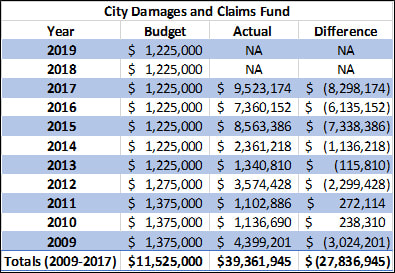City Will Borrow for Police Settlement
Milwaukee has borrowed many millions to pay off police legal settlements in last decade.
The City of Milwaukee, just five months into the year, already is in the borrowing mode to pay off court settlements related to police conduct, a financing strategy that increases costs for taxpayers.
The city will borrow $2 million to pay the family of a man who died in the back of a squad car, and will borrow another $2.3 million to to pay the family of a man who died in jail of an epileptic seizure about 18 hours after telling police he did not have his regular dose of anti-seizure medicine, according to city documents and Budget and Management Director Dennis Yaccarino.
Interest alone could add a million dollars or more to the total price tag over the life of the bonds, depending on their longevity and interest rates.
Borrowing for police-related settlements, however, is on the increase not only in Milwaukee, but across the country.
Here, Yaccarino said: “It is a challenge to continue to budget core city services with no growth in revenues and have no ability to set up a funding mechanism for court settlements that eliminates borrowing without impacting those core services.”
The city traditionally has relied on a $5 million contingent fund to pay settlements that exceeded the amount budgeted for them, he said.
This year, though, snow and ice removal costs are running $4.3 million over budget, melting away much of the contingent fund, Yaccarino noted.
The city’s uncomfortable position is not unique to 2019. Budget figures show it is now common for the city to pay out more in damages and claims than the total $5 million budgeted in the contingent fund.
Last year, the city borrowed $6.2 million to cover damages and claims like the police-related lawsuits it needs to borrow for now, according to city bonding documents.
“Cases normally take a long time to settle or take to court,” Yaccarino said in an email. “If the case is taken to court, I would assume we would win the case and not fund a settlement. Determining when the City takes a case to court can take a considerable amount of time as well. Occasionally a breakthrough happens and the parties settle just before we go to trial.”
“I normally don’t have enough information when preparing the budget to put a settlement amount in the budget,” he said. “The end result, if we put funding for a settlement in the budget that later turns out to not be needed that year, we will have reduced services to fund the settlement that could have been retained.”
The city also wants to be vague about what it expects to pay out in settlements because it does not want to let courtroom opponents know what it anticipates spending, Yaccarino said.
Still, the city has for several years put less money in its Damages and Claims fund than it needed to pay out. There is $1,225,000 budgeted in the account; that amount has not changed since 2013, when it was reduced by $50,000, according to city budget documents.
The 2013 amount was would be worth $1,359,416 in today’s dollars, according to the U.S. Bureau of Labor Statistics’ inflation calculator, meaning the annual amount put aside for settlements has gradually dropped in value.
Gretchen Schuldt writes a blog for Wisconsin Justice Initiative, whose mission is “To improve the quality of justice in Wisconsin by educating the public about legal issues and encouraging civic engagement in and debate about the judicial system and its operation.
Court Watch
-
No Unemployment Benefits For Worker Making Homophobic Remarks
 May 17th, 2022 by Gretchen Schuldt
May 17th, 2022 by Gretchen Schuldt
-
Appeals Court Upholds Injunction Against Abortion Protester
 Mar 13th, 2022 by Gretchen Schuldt
Mar 13th, 2022 by Gretchen Schuldt
-
80% of State’s Judicial Races Uncontested
 Feb 20th, 2022 by Gretchen Schuldt
Feb 20th, 2022 by Gretchen Schuldt
























Police hiring standards, their training and supervision need to be brought to a higher level.
Too often, bullying and superiority complexes are factors that influence police conduct.